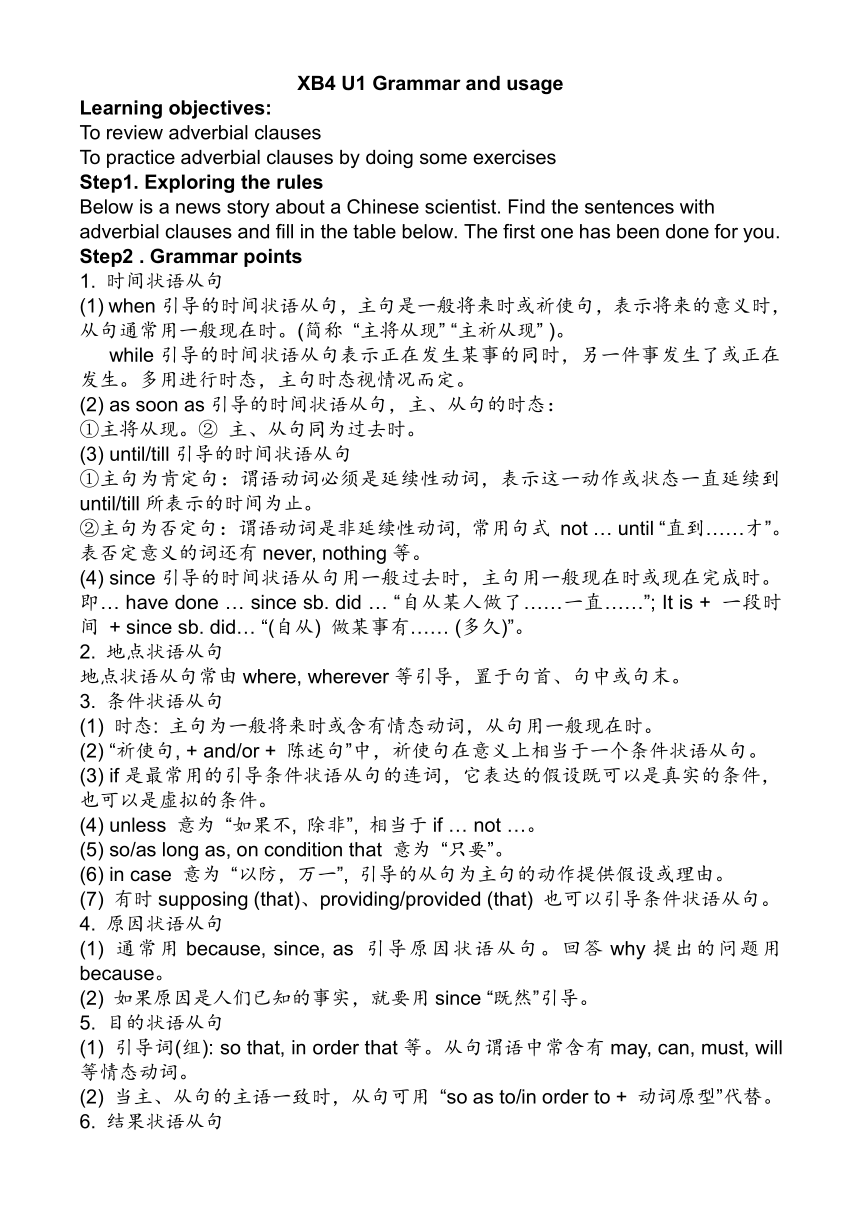译林版(2019)选择性必修 第四册Unit 1 Honesty and responsibility Grammar and usage 导学案(无答案)
文档属性
| 名称 | 译林版(2019)选择性必修 第四册Unit 1 Honesty and responsibility Grammar and usage 导学案(无答案) |  | |
| 格式 | docx | ||
| 文件大小 | 19.3KB | ||
| 资源类型 | 教案 | ||
| 版本资源 | 牛津译林版(2019) | ||
| 科目 | 英语 | ||
| 更新时间 | 2025-02-07 23:05:37 | ||
图片预览

文档简介
XB4 U1 Grammar and usage
Learning objectives:
To review adverbial clauses
To practice adverbial clauses by doing some exercises
Step1. Exploring the rules
Below is a news story about a Chinese scientist. Find the sentences with adverbial clauses and fill in the table below. The first one has been done for you.
Step2 . Grammar points
1. 时间状语从句
(1) when引导的时间状语从句,主句是一般将来时或祈使句,表示将来的意义时,从句通常用一般现在时。(简称 “主将从现” “主祈从现” )。
while引导的时间状语从句表示正在发生某事的同时,另一件事发生了或正在发生。多用进行时态,主句时态视情况而定。
(2) as soon as引导的时间状语从句,主、从句的时态:
①主将从现。② 主、从句同为过去时。
(3) until/till引导的时间状语从句
①主句为肯定句:谓语动词必须是延续性动词,表示这一动作或状态一直延续到until/till所表示的时间为止。
②主句为否定句:谓语动词是非延续性动词, 常用句式 not … until “直到……才”。表否定意义的词还有never, nothing等。
(4) since引导的时间状语从句用一般过去时,主句用一般现在时或现在完成时。即… have done … since sb. did … “自从某人做了……一直……”; It is + 一段时间 + since sb. did… “(自从) 做某事有…… (多久)”。
2. 地点状语从句
地点状语从句常由where, wherever等引导,置于句首、句中或句末。
3. 条件状语从句
(1) 时态: 主句为一般将来时或含有情态动词,从句用一般现在时。
(2) “祈使句, + and/or + 陈述句”中,祈使句在意义上相当于一个条件状语从句。
(3) if是最常用的引导条件状语从句的连词,它表达的假设既可以是真实的条件,也可以是虚拟的条件。
(4) unless 意为 “如果不, 除非”, 相当于if … not …。
(5) so/as long as, on condition that 意为 “只要”。
(6) in case 意为 “以防,万一”, 引导的从句为主句的动作提供假设或理由。
(7) 有时supposing (that)、providing/provided (that) 也可以引导条件状语从句。
4. 原因状语从句
(1) 通常用because, since, as 引导原因状语从句。回答why提出的问题用because。
(2) 如果原因是人们已知的事实,就要用since “既然”引导。
5. 目的状语从句
(1) 引导词(组): so that, in order that等。从句谓语中常含有may, can, must, will等情态动词。
(2) 当主、从句的主语一致时,从句可用 “so as to/in order to + 动词原型”代替。
6. 结果状语从句
(1) 如此……以致于……: so + 形容词 / 副词 + that, such + a / an + 形容词 + 单数可数名词 + that, such + 形容词 + 复数可数名词/不可数名词 + that, so + 形容词 + a / an + 单数可数名词 + that. 当名词前面有many或much修饰时,用so而不用such。
(2) so … that 句型的否定形式可用too … to … 或 not … enough to构成的简单句代替。
7. 让步状语从句
(1) although, though, even if/though都作 “虽然,尽管”讲。
(2) as引导让步状语从句时,把表语提前构成倒装,通常可换成though。作表语的单数可数名词前如有冠词,冠词需要省去。
(3) whether … or … “不管…….还是……”
(4)whatever,whoever,wherever, whenever, however和 “no matter + what/who/where/when/how” 都可以引导让步状语从句,可以互换。
8.比较状语从句:比较状语从句常由 as … as …(和……一样), not so/as … as … (不如……那样……), than (比)引导。
9.方式状语从句:方式状语从句通常由as if/though(好像, 似乎), as (按照)引导。
Step3. 选用括号内合适的内容完成下列句子。
1. ________ (If, Before) he met that American girl, he couldn't speak English.
2. He smiled politely ________ (as, once) Mary apologized for her drunken friends.
3. ________ (Unless, Although) he doesn't speak Italian, he always goes to Italy on holiday.
4. Hard ________ (as, while) she tried, Ella found it difficult to make any progress in math.
5. ________ (While, Once) I always felt I would pass the exam, I never thought I would get an A.
6. I'm going to ask someone else, ________ (before, since) you obviously don't know the answer.
7. A number of high buildings have arisen ________ (when, where) there was nothing a year ago.
8. ________ (However, Whatever) hard you try, it is difficult to lose weight without cutting down the amount you eat.
9. Please call my secretary to arrange a meeting ________ (whenever, however) it is convenient for you.
10. You can always manage to do more things if you would like to, ________ (whatever, however) full your schedule is.
Step4. Finish exercises.(B1&B2)
Learning objectives:
To review adverbial clauses
To practice adverbial clauses by doing some exercises
Step1. Exploring the rules
Below is a news story about a Chinese scientist. Find the sentences with adverbial clauses and fill in the table below. The first one has been done for you.
Step2 . Grammar points
1. 时间状语从句
(1) when引导的时间状语从句,主句是一般将来时或祈使句,表示将来的意义时,从句通常用一般现在时。(简称 “主将从现” “主祈从现” )。
while引导的时间状语从句表示正在发生某事的同时,另一件事发生了或正在发生。多用进行时态,主句时态视情况而定。
(2) as soon as引导的时间状语从句,主、从句的时态:
①主将从现。② 主、从句同为过去时。
(3) until/till引导的时间状语从句
①主句为肯定句:谓语动词必须是延续性动词,表示这一动作或状态一直延续到until/till所表示的时间为止。
②主句为否定句:谓语动词是非延续性动词, 常用句式 not … until “直到……才”。表否定意义的词还有never, nothing等。
(4) since引导的时间状语从句用一般过去时,主句用一般现在时或现在完成时。即… have done … since sb. did … “自从某人做了……一直……”; It is + 一段时间 + since sb. did… “(自从) 做某事有…… (多久)”。
2. 地点状语从句
地点状语从句常由where, wherever等引导,置于句首、句中或句末。
3. 条件状语从句
(1) 时态: 主句为一般将来时或含有情态动词,从句用一般现在时。
(2) “祈使句, + and/or + 陈述句”中,祈使句在意义上相当于一个条件状语从句。
(3) if是最常用的引导条件状语从句的连词,它表达的假设既可以是真实的条件,也可以是虚拟的条件。
(4) unless 意为 “如果不, 除非”, 相当于if … not …。
(5) so/as long as, on condition that 意为 “只要”。
(6) in case 意为 “以防,万一”, 引导的从句为主句的动作提供假设或理由。
(7) 有时supposing (that)、providing/provided (that) 也可以引导条件状语从句。
4. 原因状语从句
(1) 通常用because, since, as 引导原因状语从句。回答why提出的问题用because。
(2) 如果原因是人们已知的事实,就要用since “既然”引导。
5. 目的状语从句
(1) 引导词(组): so that, in order that等。从句谓语中常含有may, can, must, will等情态动词。
(2) 当主、从句的主语一致时,从句可用 “so as to/in order to + 动词原型”代替。
6. 结果状语从句
(1) 如此……以致于……: so + 形容词 / 副词 + that, such + a / an + 形容词 + 单数可数名词 + that, such + 形容词 + 复数可数名词/不可数名词 + that, so + 形容词 + a / an + 单数可数名词 + that. 当名词前面有many或much修饰时,用so而不用such。
(2) so … that 句型的否定形式可用too … to … 或 not … enough to构成的简单句代替。
7. 让步状语从句
(1) although, though, even if/though都作 “虽然,尽管”讲。
(2) as引导让步状语从句时,把表语提前构成倒装,通常可换成though。作表语的单数可数名词前如有冠词,冠词需要省去。
(3) whether … or … “不管…….还是……”
(4)whatever,whoever,wherever, whenever, however和 “no matter + what/who/where/when/how” 都可以引导让步状语从句,可以互换。
8.比较状语从句:比较状语从句常由 as … as …(和……一样), not so/as … as … (不如……那样……), than (比)引导。
9.方式状语从句:方式状语从句通常由as if/though(好像, 似乎), as (按照)引导。
Step3. 选用括号内合适的内容完成下列句子。
1. ________ (If, Before) he met that American girl, he couldn't speak English.
2. He smiled politely ________ (as, once) Mary apologized for her drunken friends.
3. ________ (Unless, Although) he doesn't speak Italian, he always goes to Italy on holiday.
4. Hard ________ (as, while) she tried, Ella found it difficult to make any progress in math.
5. ________ (While, Once) I always felt I would pass the exam, I never thought I would get an A.
6. I'm going to ask someone else, ________ (before, since) you obviously don't know the answer.
7. A number of high buildings have arisen ________ (when, where) there was nothing a year ago.
8. ________ (However, Whatever) hard you try, it is difficult to lose weight without cutting down the amount you eat.
9. Please call my secretary to arrange a meeting ________ (whenever, however) it is convenient for you.
10. You can always manage to do more things if you would like to, ________ (whatever, however) full your schedule is.
Step4. Finish exercises.(B1&B2)
同课章节目录
